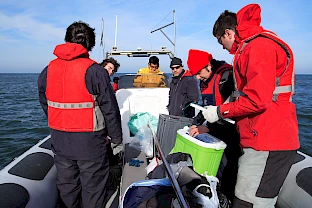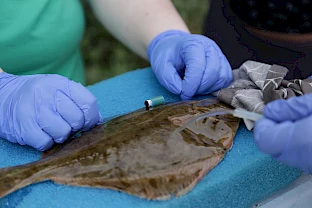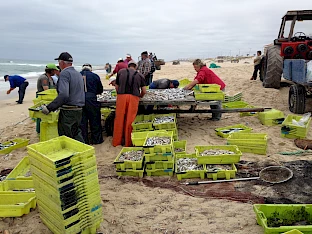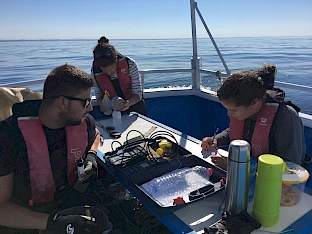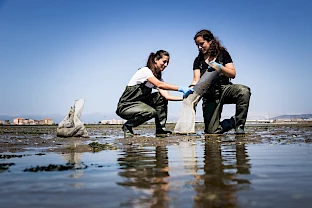Pls
Miguel Pardal
Filipe Martinho
The Marine Resources, Conservation and Technology Group promotes interdisciplinary research linking climate change, anthropogenic impacts on marine organisms, environmental and human safety, as well as developing sustainable seafood production combining cutting-edge approaches to aquaculture, nutrition, and marine biotechnology. The core objective is to contribute to a healthy and sustainable ocean by leveraging a unique integration between science, industry, and society, while embodying the UN Sustainable Development Goals and the AICHI Targets for the conservation and restoration of biodiversity.
The Biodiversity and Fisheries Research Line is dedicated to understanding the impacts of climate change and extreme weather events on marine and estuarine organisms, based on long-term data sets and field monitoring programs, together with state-of-the-art technology and advanced analytics for biodiversity conservation and fisheries sustainability.
Research topics include population dynamics and connectivity in benthic invertebrates, plankton, and fishes across diverse temporal and spatial scales. This involves unravelling autochthonous and invasive alien species distributions along environmental gradients, while emphasizing community structure and composition, population dynamics, migrations and habitat use, ecological links, and evolutionary biology.
This research line is also actively engaged in assessing fisheries landings, evaluating bycatch, and understanding the subsequent impacts on stocks, harnessing the potential of biological observations, image sampling, machine learning and AI techniques for informing management of fish populations and conservation efforts. By contributing to the formulation of science-based policy for fisheries management and for the establishment and enhancement of Marine Protected Areas, which are key ecosystems for the safeguard of marine biodiversity and habitats, this research line aims to promote a harmonious coexistence between human activities and marine wildlife for future generations.
The Blue Biotechnology and Safety Research Line is based on three fundamental pillars: resource valorisation, aquaculture nutrition, and environmental and human safety. The integration of biotechnological methods plays a key role in the extraction and development of innovative products from marine organisms, including potential applications such as medicines, food, bioplastics, and bioenergy. This approach not only fosters economic progress but also environmental and health benefits.
In line with the principles of circular economy, the focus in aquaculture is on testing alternative, sustainable feed ingredients that reduce the reliance on wild-caught fishmeal protein. Through the use of experimental methodologies in fish and crustacean nutrition, the aim is to develop novel feeds and farming strategies, with emphasis on lipid synthesis, regulation, composition, and the establishment of reliable, cost-effective, and rapid metabolite profiles for muscle/fillets.
This research line is also committed to develop new tools to assess the impact of human activities on aquatic resources. Particular attention is devoted to emergent pollutants, including (micro)plastics, metals, pharmaceuticals, pesticides, as well as biological agents. By monitoring their presence and assessing potential adverse effects, the aim is to establish environmental quality standards for the aquatic compartment and ensure food security. This aligns with the growing recognition of the importance of maintaining a healthy balance between human nutrition and environmental protection, encompassing the inputs and outputs of the industrial food process.
The Marine Resources, Conservation and Technology Research Group is a member of the Portuguese node of the European Marine Biological Resource Centre (EMBRC-PT, through ACOI-UC) and promotes education, outreach, and citizen science activities, embodying the STEAM approach to contribute to ocean literacy.




